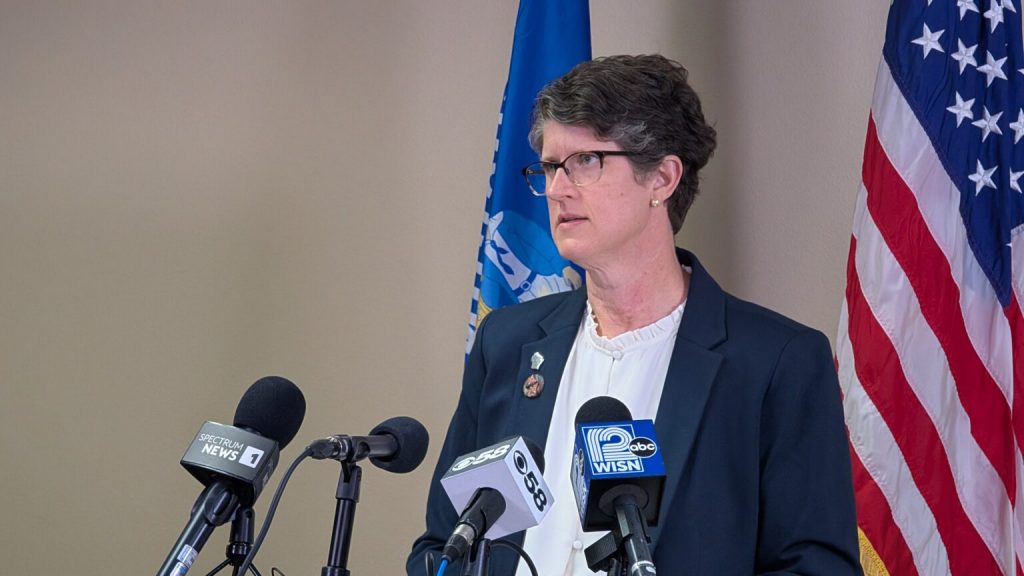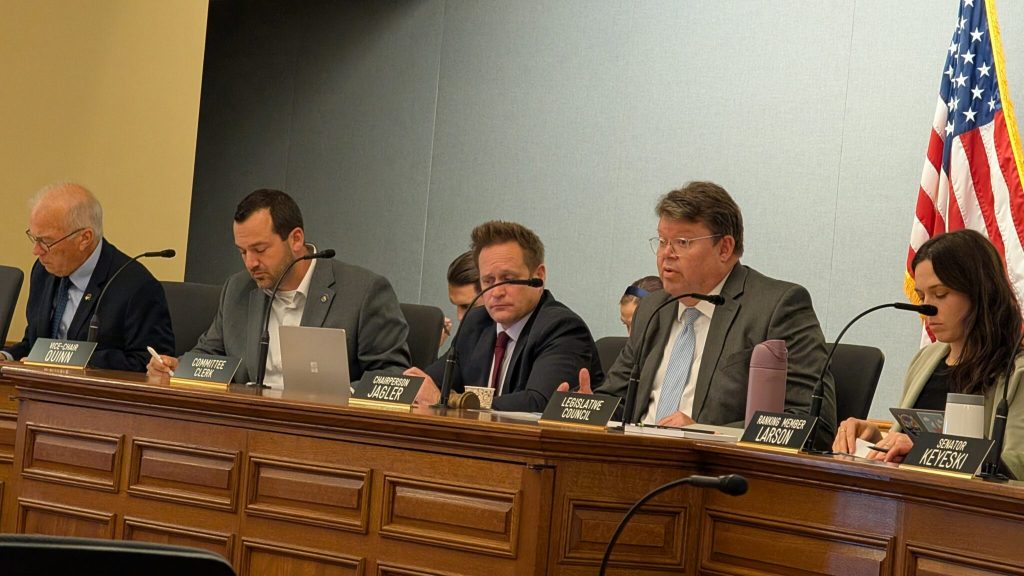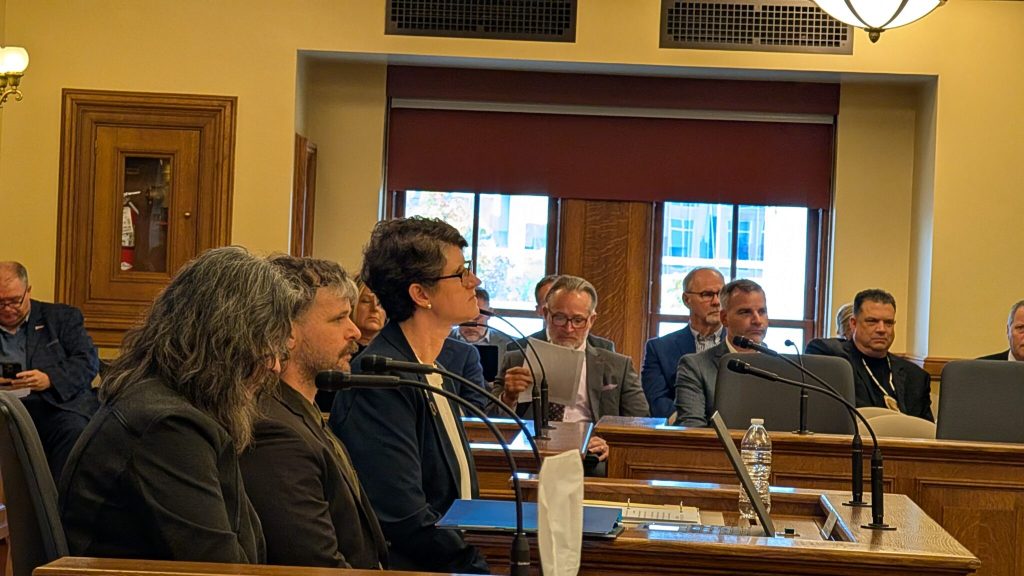Superintendent Jill Underly Makes Changes on Sexual Misconduct
Legislative committee grills her on handling of 'sexual grooming' by teachers.

“It’s been deeply disappointing to see attempts to turn this serious issue into yet another partisan political sideshow. Our kids deserve better than that. Wisconsin families deserve better than that,” Underly said at a press conference. (Photo by Baylor Spears/Wisconsin Examiner)
State Superintendent Jill Underly said allegations of mishandled sexual misconduct and grooming by teachers have been turned into a “partisan political sideshow” as she announced that her agency is launching a database to list the names of teachers who have surrendered their licenses or had them revoked. She also laid out other actions that could be taken to improve the current system for responding to allegations.
It was the first time that Underly spoke to the public in person since the publication of a CapTimes report that found there were over 200 investigations into teacher licenses due to allegations of sexual misconduct or grooming from 2018 to 2023. The investigation led to an outcry from lawmakers, who said they want action to ensure students are safe.
Underly told reporters at a press conference ahead of the hearing Tuesday in the Senate Education Committee that she was interested in “protecting Wisconsin’s children” whether they are in public, private or charter schools and she called on policymakers to work towards solutions and stay away from “finger pointing” and “political theater.”
“It’s been deeply disappointing to see attempts to turn this serious issue into yet another partisan political sideshow. Our kids deserve better than that. Wisconsin families deserve better than that,” Underly said. “But we won’t be distracted or deterred, and our focus remains exactly where it belongs on protecting kids.”
Underly’s comments come after U.S. Rep. Tom Tiffany, a Republican gubernatorial hopeful, who stood alongside state Republican lawmakers, suggested during a press conference that Gov. Tony Evers needed to “call on Jill Underly to either do her job or step aside” and connected the issue of sexual misconduct and grooming to “indoctrination” through liberal curriculum in schools. Washington County Executive and gubernatorial hopeful Josh Schoemann outright called for Underly’s resignation.
Underly told reporters that calls for her resignation are “preposterous.”
Underly said she will also attend the Joint Audit Committee hearing on Wednesday where lawmakers plan to launch an audit into the educational licensure revocation, suspension, restriction and investigation at DPI.
During both the press conference and the committee hearing, Underly rejected claims that the agency is shielding information from the public, but said there is more work that can be done to strengthen the agency and the state’s current processes.
“The department does not cover up misconduct. We do not shield information from the public. We do not ignore allegations. We do everything in our power to remove those who harm children from classrooms, and we do it urgently and decisively,” Underly said. “Unfortunately, some have chosen to use this deeply sensitive issue to score political points and that doesn’t protect children. It distracts from real solutions.”
Sen. John Jagler (R-Watertown), who chairs the Senate Education Committee, opened the Senate hearing by saying that the response by DPI, including Underly’s absence from the GOAT committee hearing, was “disturbing” to him.

“The bottom line is kids’ safety needs to be the No. 1 priority, full stop, and I believe that’s what we hope to investigate today and look into how we can help make this a better situation for our kids,” Sen. John Jagler said. (Photo by Baylor Spears/Wisconsin Examiner)
“The bottom line is kids’ safety needs to be the No. 1 priority, full stop, and I believe that’s what we hope to investigate today and look into how we can help make this a better situation for our kids,” Jagler said.
Underly said there are several “practical” and “achievable” steps her agency is taking and Wisconsin policymakers could take to bolster safety for students.
Defining grooming
One of the top steps that Underly identified is for the state to define “grooming” in state law. She said that the agency already investigates and pursues license revocations for teachers accused of grooming students for sexual exploitation and for predatory behavior, but clarifying a definition could help ensure consistency.
A bill, coauthored by Rep. Amanda Nedweski (R-Pleasant Prairie) and Sen. Jesse James (R-Thorp), would define “grooming” in state statute and make it a felony to engage in grooming a child for sexual activity.
Underly said she welcomes conversations about the bill.
Under the bill, “grooming” would be defined as “a course of conduct, pattern of behavior, or series of acts with the intention to condition, seduce, solicit, lure, or entice a child for the purpose of engaging in sexual intercourse or sexual contact, or for the purpose of producing, distributing, or possessing depictions of the child engaged in sexually explicit conduct.”
It also lists examples of behavior that would constitute grooming including verbal comments or conversations of a sexual nature directed at a child; inappropriate or sexualized physical contact; written, electronic and communication over text and social media to lure or entice a child; promising gifts, privileges, or special attention to lower a child’s inhibitions or create emotional dependence; and acts intended to isolate a child from family or peers.
The authors of the bill said in a memo that the bill builds on the state laws on grooming that exist in Florida, Texas, Ohio and Illinois.
A person convicted of a grooming charge would be guilty of a Class G felony, that would increase to a Class F felony if the person is in a position of trust or authority, and to a Class E felony if the child has a disability and to a Class D felony if the violation involves two or more children. A convicted person would also need to register as a sex offender.
Other agency and legislative steps
Lawmakers on the committee also asked about the number of staff dedicated to investigating allegations.
Underly said they have 1.5 employees working on license investigations and those employees have access to the agency’s team of attorneys.
Underly said it would be helpful to have more resources, though she emphasized that providing subpoena power to the agency would help speed investigations along.
“We need to strengthen our investigations today. The DPI lacks subpoena power during investigations, meaning we rely on voluntary cooperation of witnesses, district officials, and others to gather critical information,” Underly said. “Even limited authority would allow us to gather evidence more efficiently and act faster to protect kids.”
Deputy State Superintendent Tom McCarthy noted during the hearing that the agency can become involved in any stage of the process of dealing with allegations, but it is not typically the primary investigator in cases.
“Most of the time, we are being notified by law enforcement, by county child welfare, by a district who has subsequently said, ‘Hey, we have a teacher who is being investigated by law enforcement or there’s a scenario over here.’
The agency’s role focuses on investigating whether an educator’s license should be removed or whether they should seek a voluntary surrender from someone under investigation. During investigations, McCarthy said the agency typically relies on gathering credible information from law enforcement, school districts, local partners and others. He said even if there isn’t information readily available to be shared with the agency they are still working to “go after these people.”

Superintendent Jill Underly taking questions from lawmakers on the Senate Education Committee.( Photo by Baylor Spears/Wisconsin Examiner)
“What’s happening with the 1.5 staff is, they’re often following up, saying, ‘Hey, sheriff’s department, have you completed this? Hey, school district, are you done with this particular investigation.’ Without subpoena power, we’re doing that in a voluntary fashion with them. Sometimes they tell us to pound sand, and we have to wait and we have to wait and wait and wait. Sometimes we get tired of waiting and actually, just move into a voluntary surrender or revocation action, but it would be way better for the system if we weren’t always way delayed in the back seat of this entire process so that we could take swifter action.”
Underly said the agency is also working on a statewide code of conduct, which will soon be published for public comment through administrative rules and will serve as a guide for school boards developing policies on professional boundaries.
DPI has a model policy on its website for school districts, but it isn’t mandatory.
“That’s something you all would have to talk about as to whether you want that to be more than just recommended on the website,” said Jennifer Kammerud, who serves as DPI’s educator licensing director.
Another step, Underly said, includes the launch of a new online database to allow the public to view licenses that have been revoked or surrendered. She said the new tool will create more transparency by expanding on the current teacher license lookup tool.
McCarthy said it would be a little while before the website is updated with information about the reasoning behind license revocation or surrender because the information is not electronic yet. He said DPI must locate individual revocation orders and will add the information as it is gathered.
In addition, Underly said that the state needs to modernize the licensing system used for educators, but the agency needs resources to get it done. She said that allowing DPI to keep 10% of licensing fees, which is currently diverted away from the agency, would allow investments in licensing improvements and investigations.
The agency also requested $600,000 in the most recent state budget process to modernize its online background checks and licensing platform, but that was rejected by the Republican-led Legislature.
During the hearing Republican lawmakers questioned why Underly hadn’t come specifically to them with her requests. (During the most recent budget process, the Joint Finance Committee, which typically hosts agency heads to explain their budget requests, declined to invite Underly or DPI to make a presentation.)
“Obviously, I’ll never tell you how to do your job, Superintendent, but you mentioned requesting for funding — how [Joint Finance Committee] has never asked you to come talk to them. I guess in my experience [Department of Safety and Professional Standards] Sec. Dan [Hereth] was in my office asking and explaining those things,” said Sen. Romaine Quinn (R-Birchwood), who is a member of the Joint Finance Committee. “I would just say no one is going to ask you to come in and ask for more money.”
Underly also said the state needs to close loopholes for private schools. Educators employed at private schools in Wisconsin are not required to hold a DPI license, meaning staff at those schools fall outside of the agency’s investigative authority. The agency is only able to investigate and keep individuals out of schools via the licensure system.
Sen. Chris Larson (D-Milwaukee) emphasized that he wanted discussions about improving the process to cover students in public, private and other schools.
“I would hope that as we focus our attention on what is happening in the public domain, and what information is publicly available and was pulled off of a public website, and then publicly reported, that we don’t pretend that because things are private and happening in private schools and behind closed doors that the 125,000 students who are in classrooms where there is not a required licensure and where there is not required reporting and where information is not public, that we pretend that there are not problems that exist there,” Larson said.
At one point during the committee hearing, Larson asked his colleagues whether they would want to work to help close the loophole. Sen. Sarah Keyeski (D-Lodi) nodded.
“It’s a dangerous loophole and we need to close it,” Underly said.
Superintendent Jill Underly announces steps DPI is taking in response to sexual misconduct concerns was originally published by the Wisconsin Examiner.
If you think stories like this are important, become a member of Urban Milwaukee and help support real, independent journalism. Plus you get some cool added benefits.





















Perhaps obtaining a teacher’s license should be a bachelor’s degree in the subject being taught, rather than an extensive teacher education program.
Agree that ALL teachers should require a license. DPI should have some oversight of the education of ALL Wisconsin Children.